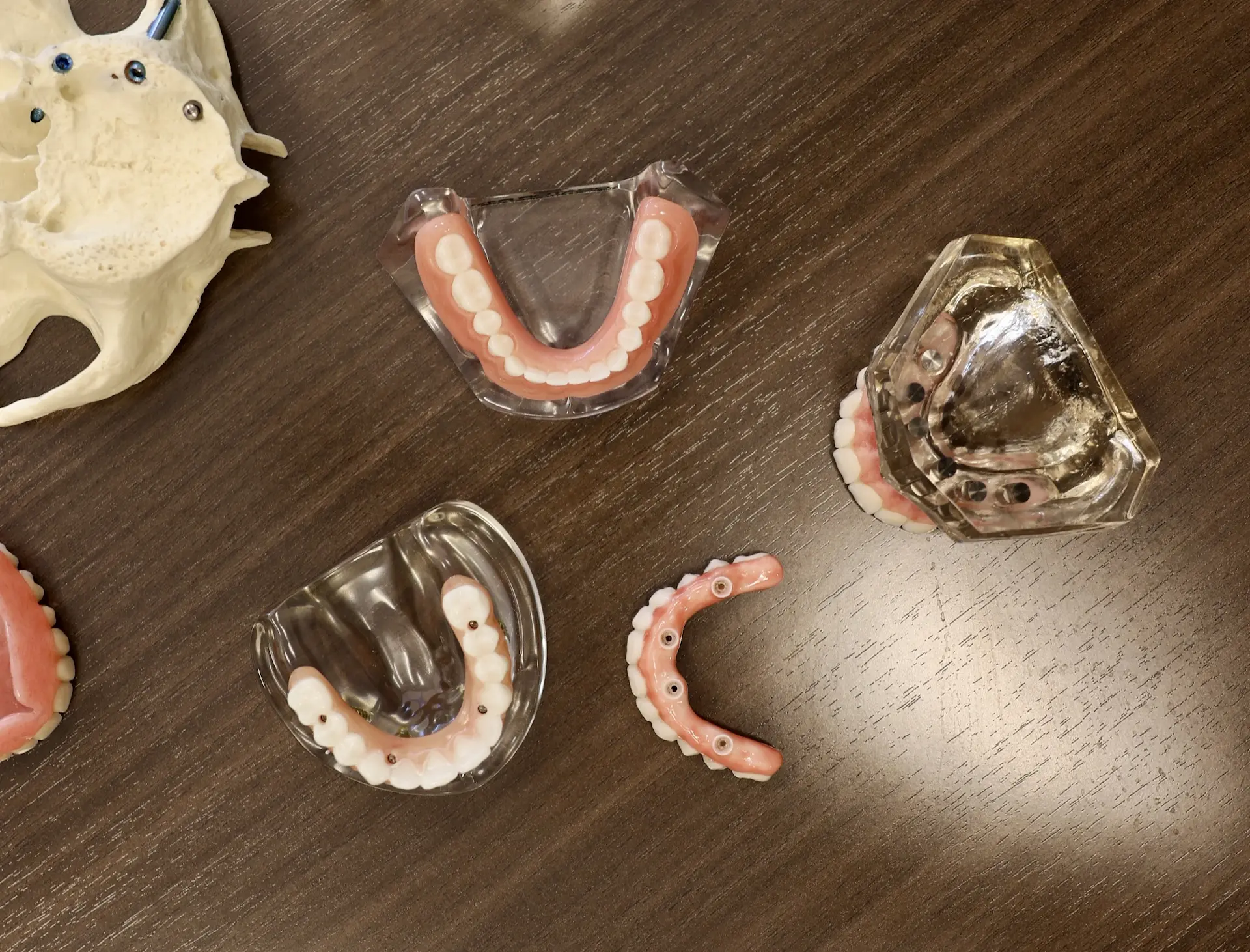At NuSet Dental Implants, we understand that making informed decisions about your dental health is essential. If you’re considering dental implants, you might be wondering about the materials used in their construction and how they can provide a reliable, long-lasting solution to missing teeth.
Dental implants are innovative restorative solutions that mimic the natural look, feel, and function of your original teeth. The materials used in their construction are carefully chosen to ensure durability, biocompatibility, and aesthetic appeal.
Key Takeaways
- The dental implant post is typically made from titanium, known for strength, durability, and bone integration.
- Zirconia is another common material used and offers a metal-free, tooth-colored option ideal for aesthetic purposes and patients with metal sensitivities.
- Titanium’s biocompatibility reduces rejection risk and helps prevent bone loss.
- Zirconia is durable, crack-resistant, and aesthetically blends with natural teeth.
- Material choice depends on biocompatibility, strength, aesthetics, and individual health needs.
What are Dental Implants Typically Made Of?
Through advancements in dental technology, dental implants are typically made of two main components: the implant itself and the crown. The implant, which serves as the new tooth root, is typically made of medical-grade titanium. This highly biocompatible material allows the implant to fuse with the jawbone, providing a solid and stable foundation for the dental prosthesis.
The crown, the visible part of the dental implant, is custom-made to match the color, shape, and size of your natural teeth. Crowns are commonly made from high-quality ceramic materials, such as porcelain or zirconia. These materials are renowned for their strength, durability, and natural appearance, resulting in a seamless integration with your existing teeth.
It’s important to note that the materials used in dental implants are carefully selected to ensure safety, longevity, and optimal oral health. They have undergone extensive testing and are proven to be biocompatible, minimizing the risk of any adverse reactions. At NuSet, your dental implant will be crafted on-site to ensure you have a custom fit that allows both a natural smile and bite.
The Most Common Type of Dental Implant Material
Titanium is the material most often used for dental implants. This is because titanium has unique qualities that make it ideal. First, it is very strong and can last a long time. Second, it is biocompatible, meaning the human body accepts it well, and the risk of rejection is very low. This makes titanium an excellent choice for creating a stable and durable foundation for replacement teeth.
One key reason dental professionals prefer titanium for the implant post is its ability to bond well with human bone, a process known as osseointegration. This bonding is crucial for the implant’s stability and helps prevent bone loss around the missing tooth area. As a result, titanium implants can restore the function and look of natural teeth and help maintain the jawbone’s structure and facial appearance.
In addition to its durability and biocompatibility, titanium is also corrosion-resistant. This means that once the implant is in place, it can withstand the moist and variable environment of the mouth without deteriorating. These qualities make titanium the go-to choice for most dental implant procedures, ensuring patients enjoy a long-lasting and reliable tooth restoration solution.
Are There Alternatives Materials for Dental Implants?
While titanium is the most common material for dental implants, alternatives are available for patients who may need or prefer something different. Zirconia is one of these alternatives, gaining popularity as a material for dental implants. Zirconia, like titanium, is strong and durable, but it has the added benefit of being tooth-colored, which makes it a great choice for those who prioritize a natural appearance.
Zirconia implants are made from a biocompatible ceramic, similar to titanium, which ensures that the body accepts the implant well. This material is also known for its resistance to cracking and ability to withstand wear and tear from daily use, such as chewing.
For patients with metal sensitivities or those looking for a metal-free option, zirconia implants offer an excellent solution.
Another advantage of zirconia is its aesthetic appeal. Since zirconia is white, it can blend in more naturally with the surrounding teeth, making it less noticeable than the metallic color of titanium. This can be particularly important for implants in the front of the mouth, where they are more visible.
What Are the Factors Affecting Dental Implant Material Selection?
When selecting the right material for your dental implant, some important factors must be considered. At NuSet Dental Implants, we understand that this decision plays a crucial role in your implant’s long-term success and satisfaction. So, let’s take a closer look at the main factors that influence dental implant material selection:
Biocompatibility
The material used in your implant should be biocompatible, meaning it won’t cause any adverse reactions in your body. That’s why we often recommend titanium and zirconia, as they are known for their high biocompatibility and excellent performance in implants.
Strength and Durability
Your implant needs to be strong and durable enough to withstand the forces of chewing and biting over many years. Titanium is well-known for its strength and durability, and zirconia also offers a viable alternative with impressive strength properties.
Aesthetics
If your implant is replacing a front tooth, its appearance becomes especially important. That’s where zirconia shines. Its tooth-colored appearance makes it a preferred option for those who value the visual aspect of their dental implants.
Allergies or Sensitivities
While rare, some individuals may have allergies or sensitivities to certain metals. If you fall into this category, zirconia could be a preferable choice.
By carefully considering these factors, our experienced dental professionals can recommend the most suitable material for dental implants. Rest assured that we prioritize your long-term success and satisfaction, considering your specific needs and concerns every step of the way.
Am I a Candidate for Dental Implants?
Several important factors must be considered when deciding if dental implants are the best choice for you. We understand that it can feel overwhelming, but rest assured, our team at NuSet is here to guide you every step of the way. Here’s what determines if you’re a good candidate for dental implants:
General Health
Your overall health plays a crucial role in the success of dental implants. While certain conditions, such as uncontrolled diabetes or heart disease, may impact your ability to heal properly after the surgery, NuSet’s specialists will help ensure your candidacy for dental implants.
Oral Health
The health of your gums and remaining teeth is equally important. NuSet’s specialists will help address any existing gum disease or other oral health issues before moving forward with dental implants. A solid foundation is essential for long-term success.
Bone Density
Adequate bone in your jaw is necessary to support the implant. If you have experienced bone loss, don’t worry – a bone graft may be an option to provide the necessary support for your implant. Our team will assess your bone density and determine the most appropriate course of action.
Lifestyle Factors
Certain lifestyle habits, such as smoking or heavy drinking, can impact the healing process and long-term success of your implant. If you smoke or drink heavily, it may be necessary to make some adjustments or seek support to ensure the optimal outcome for your dental implants.
Commitment to Oral Hygiene
Just like natural teeth, dental implants require proper care and maintenance. Oral hygiene and regular check-ups are essential to protecting your investment and maintaining a healthy smile. Our team will provide the guidance and tools you need to keep your implants in great shape.
Patience for the Process
It’s important to understand that the journey to dental implants takes time. From the initial consultation to the final placement, several months may be involved. Patience and adhering to your dentist’s instructions are key to achieving the best results.
Remember, the best way to determine your candidacy is through a consultation with a dental professional who can assess your unique situation and provide personalized advice and guidance.
How to Care For Your Dental Implants
Caring for your dental implants is essential for their longevity and your oral health. Here’s a couple of top tips for keeping your implants in top shape:
- Use a soft-bristled toothbrush and non-abrasive toothpaste.
- Use implant-safe floss or a water flosser to clean around implants.
- Schedule check-ups and cleanings to monitor implant health.
- Smoking can hinder healing and implant durability.
- Protect your implants from damage by avoiding hard or sticky foods.
- Avoid using your implants as tools to open packages or bite hard objects.
- Adhere to your dentist’s aftercare instructions immediately following surgery.
Transform Your Smile with Confidence
When it comes to replacing missing teeth, dental implants reign supreme, offering a solution that seamlessly blends functionality and aesthetic appeal. Crafted from top-quality materials like titanium and zirconia, these implants are designed to stand the test of time, lasting over ten years with proper care.
Are you ready to take that exciting first step toward a stunning, natural-looking smile that stands the test of time? Contact us at NuSet Dental Implants today and let us help you achieve the smile you’ve always dreamed of with the gold standard in tooth replacement therapy.
Frequently Asked Questions
What are the materials used in dental implants?
The most common materials used in dental implants are titanium and zirconia. Titanium is renowned for its strength, durability, and biocompatibility, making it the most popular choice for implant surgery. Zirconia, a type of ceramic, is also used, especially for patients seeking a metal-free option due to allergies or preferences.
What is the best dental implant material?
The “best” material for dental implants depends on individual needs and preferences. Titanium is often preferred for its long history of success, osseointegration capabilities, and overall durability. Zirconia is chosen for its aesthetic qualities and hypoallergenic properties and is also considered a long-lasting and durable material. Both materials are excellent choices, offering unique benefits.
How long do dental implants last?
With proper care and maintenance, dental implants can last over ten years. The longevity of a dental implant is influenced by factors such as oral hygiene practices, lifestyle choices (e.g., smoking), and regular dental check-ups. Implants are designed to be a long-term, if not lifetime, solution for tooth loss.
What are the three types of dental implants?
- Endosteal Implants: This is the most common type, placed directly into the jawbone. Once the surrounding gum tissue has healed, a second surgery is needed to connect a post to the original implant, with your new tooth (or teeth) attached afterward.
- Subperiosteal Implants: These are placed under the gum but on, or above, the jawbone. This option is used for patients who do not have enough healthy natural jawbone and cannot, or do not want to, undergo a bone augmentation procedure to rebuild it.
- Zygomatic Implants: This is the least common type, placed in the cheekbone rather than the jawbone. It is an option for those with insufficient jawbone for the endosteal implant.





